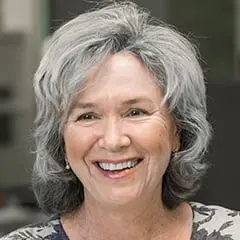 | 1 LU / HSW |
 | 1 LU / HSW |
Room: F150-151
Furnished by: Smith System + Steelcase Learning
Audience: Architects, Educators and Facilities Personnel

Call to Action: Attendees will be able to create a better learning spaces using biophilic design strategies. Attendees can assess the well-being and learning efficacy of their spaces using the surveys and other assessment techniques we will share. Attendees will be able to compose their own research following our model, so they can speak with an authoritative voice about the power of design to make a positive impact in the lives of young people.
Abstract: How do we convince decision-makers of the power and impact of design? This session will present an approach of Research, Design and Assessment. We will review findings from our AIA Upjohn grant-funded study which associates biophilic design with reduced student stress and improved learning. Attendees will see how the team applied this evidence to create innovative spaces that inspire awe, mental health and learning. Finally, we will review an assessment of student perceptions, behavior and performance after their first year in the school. The presentation team includes a researcher, designer, educator and school district operations officer who collaborated to validate biophilic design’s positive impact and to create an evidence-based process you can replicate in your school district or with your clients.
Learning Objectives:

Jim is an architect, researcher and Principal at Craig Gaulden Davis in Baltimore and has designed learning space throughout the east coast for 35 years. Jim leads teams of neuroscientists, educators, architects and artists in peer-reviewed architectural research providing evidence that design has the power to promote wellness and improve learning. His work has been presented throughout the country and has been cited by international teams of designers and academics.

Will is currently the Chief Operations Officer for Richland School District Two in Columbia SC. In that position, Will’s primary role is to provide safe and secure learning environments and those support services to students and staff. He has been COO since 2017. Prior to COO, Will was the Director of Planning for Richland Two. Will has a B. S. in Geography from University of South Carolina and Masters in Public Administration from Clemson University. He is active in his community through involvement with coaching youth sports, serving on the American Heart Association Board, past president of the SC Chapter of A4LE and other charitable organizations. Will and his wife live in Columbia SC with their two boys.

Scott is passionate about educational spaces and student well-being. He is recognized for designing exceptional learning environments that treat facilities as interactive partners in learning inside or outside of the building; they inspire creative thinking, promote hands-on-learning, and foster connections with others. Scott is a deeply involved architect who generously uses his talents to improve the quality of life of public and educational communities. Working closely with community members to discover how a learning environment will work best, Scott’s expertise allows a fluidity between incorporating users’ needs and anticipating problems that resulting in safe, beautiful, inspiring, and value-conscious schools. His leadership has led to the design of state-of-the-art, award-winning schools that feature innovative, dynamic spaces that engage students and teachers, and in many cases, change their lives. Scott has led many community and professional organizations including the Association for Learning Environments (A4LE), PTA, Rotary, and the Greenville Chapter of the American Institute of Architects. He currently serves as one of two architects on the South Carolina Office of School Facilities Planning Guide Committee.

Crystal is Craig Gaulden Davis Architecture’s Education Specialist, and works to improve the understanding of how education spaces can enhance teaching and learning then incorporate that understanding into the design of excellent schools. She served on the Greenville County School Board for 20 years, and played a lead role in the nationally recognized program that built or renovated 70 excellent schools over a six year period. Crystal received her Doctorate in Education and Human Development from Vanderbilt University.
Design of Educational Facilities
Acts as a resource to the design team in providing ongoing guidance and support to ensure that the emerging and ultimate design aligns with the established community vision, education goals, future programming, written design standards, best/next practices and education policy.